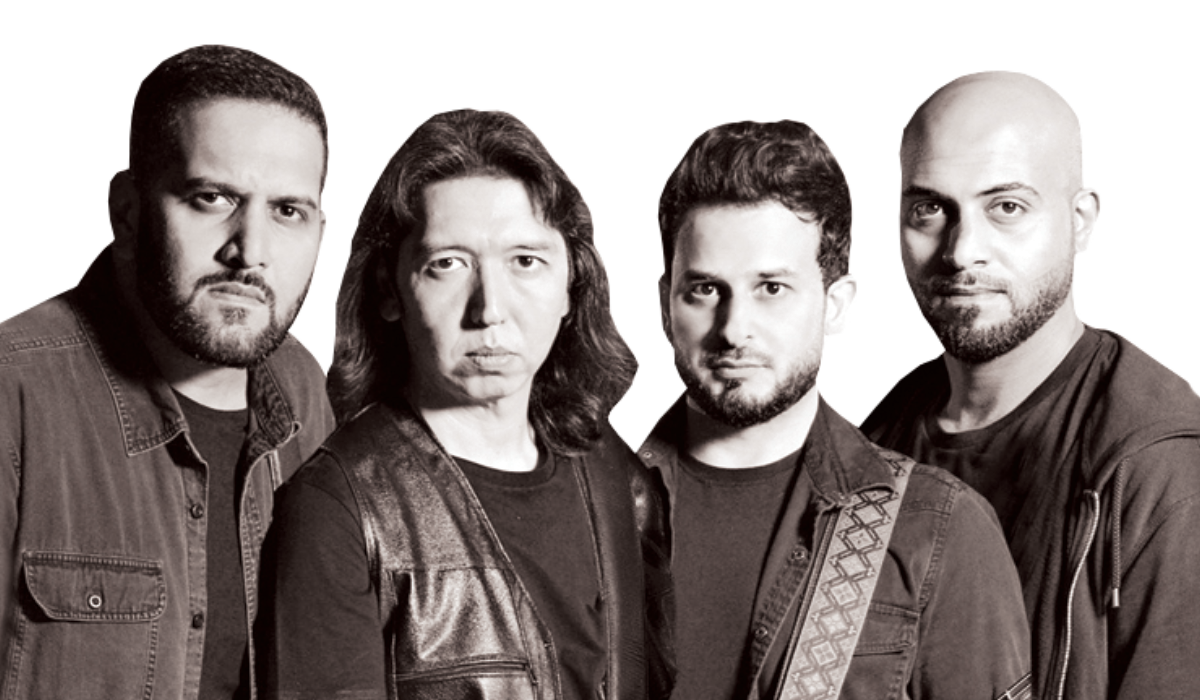JEDDAH: Saudi metal band Immortal Pain delivered a loud and lively concert at Comic Con Arabia in Jeddah, with a huge crowd of fans cheering and singing along with them.
Friday night marked the second performance of the band at the convention. They have been in the rock and metal scene since late 2005, starting with two members and later doubling.
In a previous interview with Arab News, rhythm guitarist and vocalist Emad Ashoor said the band started with only him and the lead guitarist Rasheed Attar. Later, drummer Moayad Al-Shammari and bassist Anan Al-Sabban joined the group, and just last year, they signed a contract with Saudi recording company Wall of Sound: Dark Mode.

The local band has been in the rock and metal scene since late 2005, gradually increasing their audience over the years. Instagram/immortal_pain_official. (Supplied)
The Jeddah-based band has been throwing mini-concerts across the Kingdom. They have also released original music and are working on releasing more to their Saudi, Arab, and international audiences.
While they previously spoke to Arab News about their origins, this time the members shared insight into the dynamic of the group and how they work together on making their songs and music videos.
It all begins with inspiration.
“The four of us gather, talk about our latest encounters in life and how we felt,” said the drummer Al-Shammari. “Then we express everything in music. We let our instruments talk for us.”

The four of us gather, talk about our latest encounters in life and how we felt. Then we express everything in music. We let our instruments talk for us. (Supplied)
On the unusual places or moments that can inspire, Al-Shammari said: “One day, I was passing by a construction site, and the sounds of wrecking and drilling inspired me somehow and I made a song based on the noise of the construction site.”
Ashoor, gifted with a poetic sense, takes over the next step of writing the lyrics.
So far, they have been writing lyrics in English, but they all agreed they were open to the challenge of writing in Arabic and were eager to experiment and evolve with their music.
The four of us gather, talk about our latest encounters in life and how we felt. Then we express everything in music. We let our instruments talk for us.
Moayad Al-Shammari, Immortal Pain drummer
Once the lyrics are in place, they decide upon a melody and arrange the song, deciding which riff goes first and which follows. The lyrics are recorded last.
When asked about the difficult times they have encountered throughout their career, the four agreed that starting was tough as metal music was considered a Western genre and was not popular locally. Although they have supportive families, they said it was hard for them to find an audience at the very beginning.
Their audience gradually increased from a few people to several dozen, and by the time they played at Comic Con last year and this year, they had amassed about 1,000 music fans.
“Rock and metal are both on the rise contrary to what Gene Simmons and the likes of KISS might think. They can go ahead and retire if it’s getting too loud,” bassist Al-Sabban joked when asked about the metal scene in the Kingdom.
“But the local and global scenes are growing,” he said, adding that Metallica would be playing in the Kingdom next week. “As we all know, when Saudi Arabia gets involved, it’s going to be bigger and better.”
When MDLBeast announced that Metallica would be performing in Saudi Arabia, fans from across the Middle East and North Africa bought tickets to see the legendary metal band.
Immortal Pain also told Arab News exclusively that after only releasing singles, they are officially going to record their first full album first thing next year. They also revealed that in 2024, they will hit the road on a tour across the MENA region, throwing concerts in the Kingdom, the UAE, and Egypt.
Al-Shammari proudly added that they have also received an invitation to perform in Germany, and while nothing is yet confirmed, they are hoping things will work and they will hold an international concert.
For updates about the band, follow their Instagram @immortal_pain_official.























